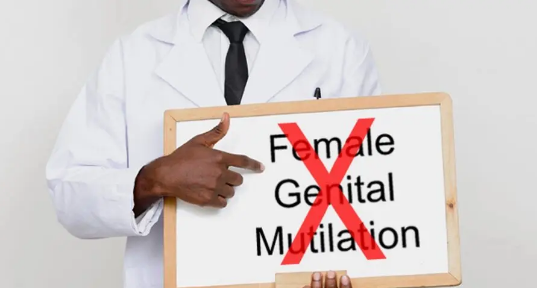Despite all efforts made in the last few years towards ending Female Genital Mutilation (FGM) in Nigeria, this topic remains controversial, and the practice continues.
TOP MEDIA reports that FGM is defined by the World Health Organization (WHO) as the procedures which involve partial or total removal of the external female genitalia and/or injury to the female genital organs, whether cultural or any other non-therapeutic reasons.
FGM is widely recognised as a violation of human rights, which is deeply rooted in cultural beliefs and perceptions over decades and generations with no easy task for change.
Female Genital Mutilations Essay
Though FGM is practiced in more than 28 countries in Africa and a few scattered communities worldwide, its burden is seen in Nigeria, Egypt, Mali, Eritrea, Sudan, the Central African Republic, and the Northern part of Ghana where it has been an old traditional and cultural practice of various ethnic groups.
Female Genital Mutilation process violates the human rights of women and girls. It constitutes gender inequality. It violates a person’s right to health and freedom. FGM leads to complications in the body of a woman and her health resulting in her death. Women are the one who suffers throughout their life after FGM.
Records show the effects of FGM to be negative and as such resulting to:
– infections
– infertility
– pain
– sexual dissatisfaction
– excessive bleeding which may lead to death, alongside psychological effects, and many others.
FGM in Nigeria is a tradition that has been upheld for centuries allegedly to maintain male dominance. It is performed to ensure women keep their virginity, to provide men with greater pleasure during sexual intercourse, and to remove genitalia that appears unattractive to the male eye.
Female Genital Mutilations Rate
About 20 million girls and women in Nigeria have undergone FGM.
Nigeria is prevalent as the country that has the third-highest number of FGM cases in globally, accounting for 10% of the global total. A 2020 United Nations (UN) brief states that 20% of Nigerian women aged 15 to 49 have undergone FGM.
Some women are unaware of the pain that comes with their genitals being mutilated and the few that remember rarely talk about it. Below is the story of an FGM survivor.
Stella, (name withheld) a 32-year-old woman and FGM survivor is an HND holder in Business Administration and Management from Waziri Umaru Federal Polytechnic Birin Kebbi, Kebbi State. She narrates her ordeal to the medium.
“Actually, I can’t testify to all but loss of sexual pleasure is the most common among them all and in which I’m battling with. And, it makes one lose interest in sex easily. Hardly will one feel or have the urge for sex but with enough foreplay, it do help at times”, she says.
“How it has affected me is that I don’t usually have urge for sex. I can stay for months without having urge. At times I won’t want to because of the pain.”
Stella has been married for seven years and she enjoys everything about her union except sex. Her challenge so far is that she has not been able to conceive but her husband has been supportive all this while. Her words: “I’m surviving with the help of my husband because he is the patient type, he do engage me in a lot of foreplay.”




